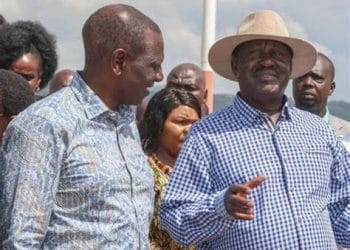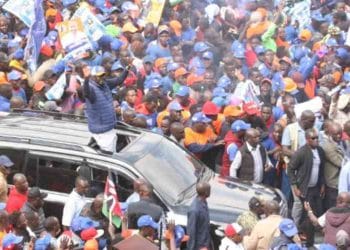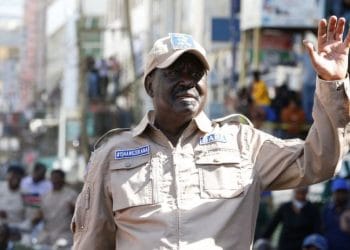Raila Amolo Odinga, who died on 15 October 2025 in India at the age of 80, will be recalled not simply as a prolific politician, but as a shaping force of Kenya’s modern political architecture, a man whose personal dramas and public campaigns helped steer the country from one party authoritarianism to a more plural, if still contested, democracy. His life will be measured by a handful of decisive moments, improbable comebacks, and strategic manoeuvres that altered institutions, inspired movements, and shaped the political imagination of generations of Kenyans.
From student activist to detained dissident
Raila Odinga’s political biography begins in a generation of turbulence. He emerged from a family already steeped in politics, the son of Oginga Odinga, a founding figure of Kenyan nationalism. In 1982, in the aftermath of a failed coup attempt against President Daniel arap Moi, Raila was arrested and charged with treason, spending years under detention and house arrest. That period of confinement, and the stigma and sacrifice that came with it, hardened his opposition to single party rule and anchored his credentials as a dissident who had risked everything for political pluralism. The memory of detention matters because it established the moral frame—he was not merely an ambitious politician, he was a participant in a long running struggle against repression.
The campaign to open the system, and the 1990s push for multiparty politics
Released and reengaged, Odinga became a central figure in the campaign to end the one party state. He marshalled students, civil society and opposition forces in a prolonged campaign that helped force the Moi regime to accept multiparty politics in the early 1990s. His combative style, and his willingness to mobilise street energy and legal advocacy alike, made him a focal point for Kenyans who longed for political choice. The political map of Kenya, including the logic of competitive elections, cannot be understood without acknowledging his role in that wider movement.
The Orange, the movement that became a party
The 2005 constitutional referendum that produced a popular, if contentious, protest symbolised Odinga’s capacity to translate civic energy into political capital. The symbol of the orange, adopted by campaigners who urged rejection of the draft constitution, subsequently coalesced into the Orange Democratic Movement, ODM, a party that established him as the leading opposition figure of the 2000s. ODM’s rapid growth, and its ability to organise at county level and in urban informal settlements, transformed Kenya’s party landscape and made Odinga a perennial presidential contender.
The 2007 election, the 2008 crisis, and the birth of the coalition government
The contested 2007 presidential election is one of the defining chapters of Odinga’s political life, and of Kenya’s contemporary history. He rejected official results that declared Mwai Kibaki the victor, a rejection that catalysed a wave of ethnic violence that cost more than a thousand lives, displaced hundreds of thousands, and threatened the fabric of the nation. The crisis ended only after mediated talks led by Kofi Annan, which produced a power sharing agreement in 2008 and, for the first time in Kenya’s history, the office of the Prime Minister, which Odinga assumed. The period tested him, and the nation, in ways that remain raw: his role is seen variously as that of a challenger who defended electoral integrity, and as a polarising actor whose methods contributed to the worst violence since independence. The compromise that followed, however, allowed Odinga to move from confrontation to governance, and to claim responsibility for stabilising the country at a perilous moment.
The 2010 constitution, a structural legacy
Perhaps the single institutional achievement most widely associated with Odinga is the 2010 constitution. The months and years that led to its adoption were messy, fractious, and intensely political, but the result was a new foundational document that curtailed executive excess, enshrined a bill of rights, created devolved government across 47 counties, and reshaped how power is distributed in Kenya. Odinga’s political leadership, his ability to keep pressure on successive administrations, and his willingness to engage constitutional processes were central to that outcome. For many Kenyans, the 2010 constitution represents a permanent, structural achievement that will outlast the fortunes of any single politician.
Electoral battles and juridical turns, 2013 to 2017 and the nullified vote
Odinga’s repeated presidential bids, in 2013 and in 2017, kept him at the centre of national politics. The 2017 election produced a legal landmark: the Supreme Court of Kenya nullified the re-election of Uhuru Kenyatta, citing irregularities in the conduct of the poll. That decision, unprecedented and fraught, was a vindication for Odinga’s legal challenge and a moment that highlighted the capacity of Kenya’s judiciary to act as a check on the electoral process. He later agreed to a political truce with Kenyatta, known as the handshake, in 2018, a move that surprised many observers and produced a new round of national reforms and a brief thaw in polarised politics. That handshake showed Odinga’s complex political instincts, his willingness to shift between opposition and conciliation when the national moment demanded it.
The handshake, the Building Bridges Initiative, and contested reform
The 2018 handshake with President Uhuru Kenyatta led to the Building Bridges Initiative, a consultative programme that proposed constitutional amendments aimed at addressing ethnic division, corruption, and governance deficits. The initiative energised debate across Kenya, and generated both popular support in some quarters and sharp legal challenges in others. In 2021 the courts ruled the BBI unconstitutional, a decision that underlined the limits of ad hoc constitutional re-engineering and which also underscored Odinga’s mixed legacy as both reformer and political tactician. The episode will be remembered for its grand ambitions, and for its complex, unresolved aftermath.
A symbol in urban politics and grassroots mobilisation
Odinga’s enduring mass appeal rested as much on his connection to urban politics and grassroots organisation as on the offices he held. His rallies in Kibera, Mathare and other informal settlements assembled tens of thousands. He gave voice to grievances about land, inequality, and the sense of exclusion that many urban Kenyans felt. For countless supporters he was “Baba,” a father figure who listened, who marched with them, and who made public sacrifice appear personal and meaningful. That relationship shaped not only election night outcomes, but also the way Kenyan civic life organises itself around charismatic leadership.
Pan African engagement and international stature
Beyond Kenya, Odinga cultivated a continental and international stature. He took roles in African Union initiatives, and he was often called upon to lend his profile to regional conversations on infrastructure, democracy, and integration. Foreign leaders, from India to Western capitals, engaged him as a statesman. Following his death, tributes from the African Union and other continental bodies emphasised his influence beyond national borders, and his reputation as a public intellectual and diplomat as well as an opposition leader.
Moments of personal reinvention and political resilience
A recurring theme in Odinga’s public life is resilience. He lost elections, faced legal and political setbacks, and endured long periods outside formal power. Yet he repeatedly returned to political centre stage, recasting himself as candidate, elder statesman, kingmaker, or negotiator, depending on the moment. His 2018 rapprochement with former rivals, his continued engagement in national politics into his late seventies, and his capacity to command an enduring personal brand reveal a politician who understood that survival in African politics often depends on reinvention rather than permanent victory.
Contested legacy, contested memory
To call his legacy unambiguous would be to misread history. Supporters cast Odinga as the conscience of the nation, the engine of constitutional reform, and the unbowed advocate for national fairness. Critics point to episodes where his confrontational tactics heightened tensions, where his mass mobilisation had unintended violent consequences, and where political deals he made were seen by some as transactional. The debates that will follow his death are therefore not only about the catalogue of his achievements, but about how to weigh ambition against consequence, mobilisation against stability. That contest over memory is itself a testament to the scale of his impact.
Why these moments matter for Kenya’s future
Odinga’s career intersects with Kenya’s institutional evolution: his activism helped open space for multiparty competition, his political decisions were integral to the constitution making process of 2010, and his legal challenges pushed the judiciary into a more prominent role as arbiter of electoral disputes. Whether future leaders choose to build on the balance of powers he helped create, or to seek new departures, will shape Kenya for decades. For many young Kenyans, the questions he foregrounded—inequality, devolution of power, and electoral integrity—remain unfinished business.
A personal, national, and generational reckon
As Kenyans file past his coffin, and as ceremonies are held in Nairobi, in Kisumu, and in Bondo, the narratives will multiply. Some will tell of the detainee who never renounced politics, some will recall the prime minister who steadied the nation after bloodshed, some will praise the constitution maker, and some will critique the methods by which he pursued power. The complexity of those recollections will guarantee that Raila Odinga’s name remains an organising reference point in Kenyan public life for a very long time.
Kenyans will remember the decisive moments: the detention in the 1980s, the campaign for multiparty politics, the mobilising power of the Orange, the crisis of 2007 and the coalition that followed, the 2010 constitution, the 2017 legal victory and the 2018 handshake, and the repeated reinventions that made him the perennial centre of Kenyan politics. Those moments, contested and celebrated, will be the shorthand by which future generations recognise the man known as Baba.



















